Niche: Explained
In ecology, a niche refers to the specific role or position of an organism within its environment, including its habitat, its interactions with other species, and its unique adaptations. It encompasses the resources the organism uses, how it interacts with other organisms, and its effect on the surrounding environment.
Components of a Niche
A niche includes the following components:
- Habitat: The specific environment where the organism lives.
- Resources: The food, water, shelter, and other essentials the organism needs to survive.
- Interactions: How the organism interacts with other species, including competition, predation, and symbiosis.
- Adaptations: The unique traits and behaviors the organism has developed to survive in its environment.
Types of Niches
There are two main types of niches:
- Fundamental Niche: The full range of conditions and resources an organism can potentially use and the roles it can potentially play in the environment.
- Realized Niche: The actual conditions and resources an organism uses and the roles it plays in the environment, taking into account competition and other environmental factors.
Study Guide: Understanding Niche
Here are some key points to understand about the concept of niche:
- Describe what a niche is and its importance in ecology.
- Explain the components of a niche and how they contribute to an organism's role in its environment.
- Discuss the differences between fundamental and realized niches.
- Give examples of different types of niches in various ecosystems.
- Analyze how changes in a niche can impact an organism and its interactions with other species.
By understanding the concept of niche, one can gain insights into how organisms are uniquely adapted to their environments and how their interactions shape the ecosystems they inhabit.
[Niche] Related Worksheets and Study Guides:
.◂Science Worksheets and Study Guides Fourth Grade. Rocks and minerals
Study Guide Rocks and minerals
Rocks and minerals  Activity Lesson
Activity Lesson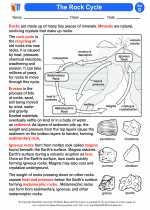 The Rock Cycle
The Rock Cycle  Worksheet/Answer key
Worksheet/Answer key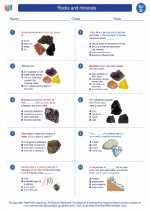 Rocks and minerals
Rocks and minerals  Worksheet/Answer key
Worksheet/Answer key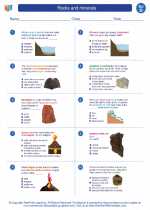 Rocks and minerals
Rocks and minerals  Worksheet/Answer key
Worksheet/Answer key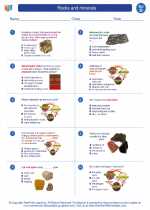 Rocks and minerals
Rocks and minerals  Worksheet/Answer key
Worksheet/Answer key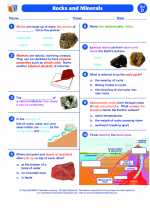 Rocks and Minerals
Rocks and Minerals  Vocabulary/Answer key
Vocabulary/Answer key Rocks and minerals
Rocks and minerals  Vocabulary/Answer key
Vocabulary/Answer key Rocks and minerals
Rocks and minerals  Vocabulary/Answer key
Vocabulary/Answer key Rocks and minerals
Rocks and minerals  Vocabulary/Answer key
Vocabulary/Answer key Rocks and minerals
Rocks and minerals 

 Activity Lesson
Activity Lesson
 Worksheet/Answer key
Worksheet/Answer key
 Worksheet/Answer key
Worksheet/Answer key
 Worksheet/Answer key
Worksheet/Answer key
 Worksheet/Answer key
Worksheet/Answer key
 Vocabulary/Answer key
Vocabulary/Answer key
 Vocabulary/Answer key
Vocabulary/Answer key
 Vocabulary/Answer key
Vocabulary/Answer key
 Vocabulary/Answer key
Vocabulary/Answer key

The resources above cover the following skills:
Concepts of Earth Science (SD1, SD2, SD3, SD4)
The student demonstrates an understanding of geochemical cycles by describing that most smaller rocks come from the breaking and weathering of larger rocks as part of the rock cycle.
The student demonstrates an understanding of geochemical cycles by recognizing the physical properties of water as they relate to the rock cycle.